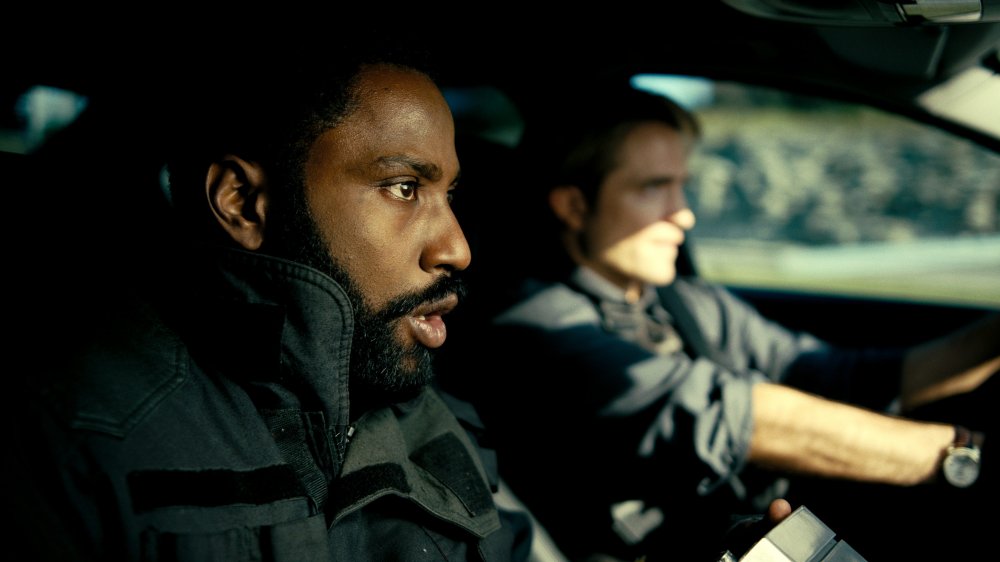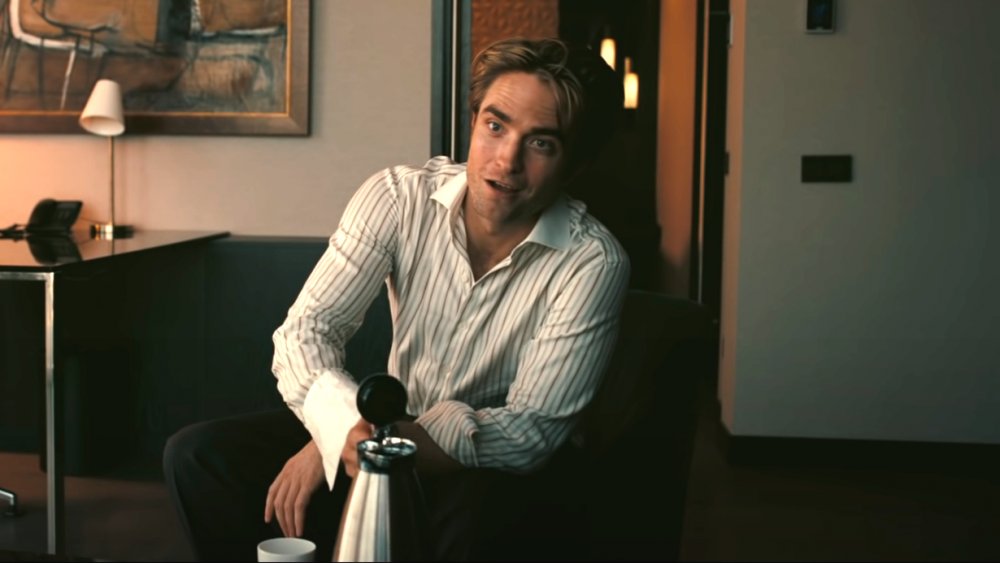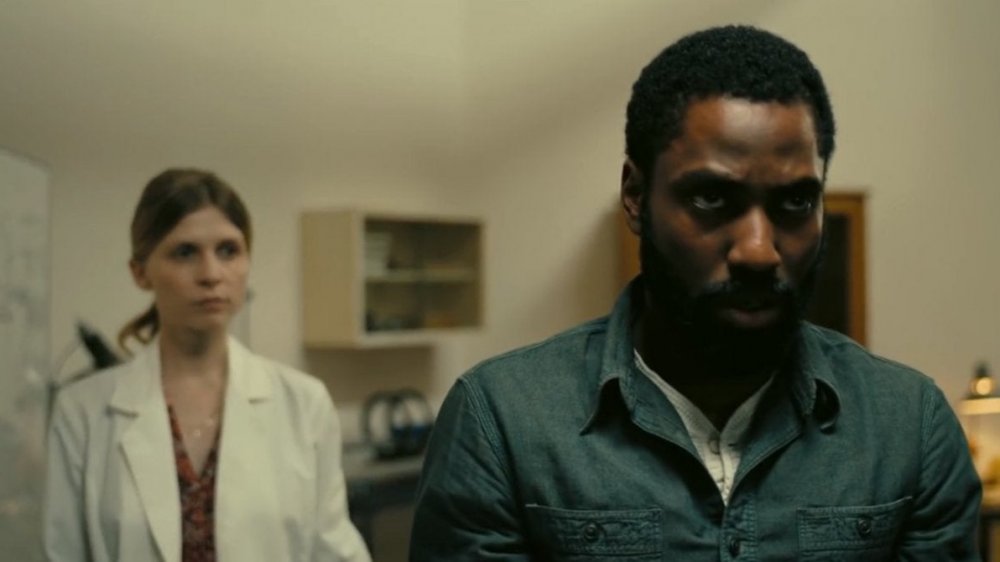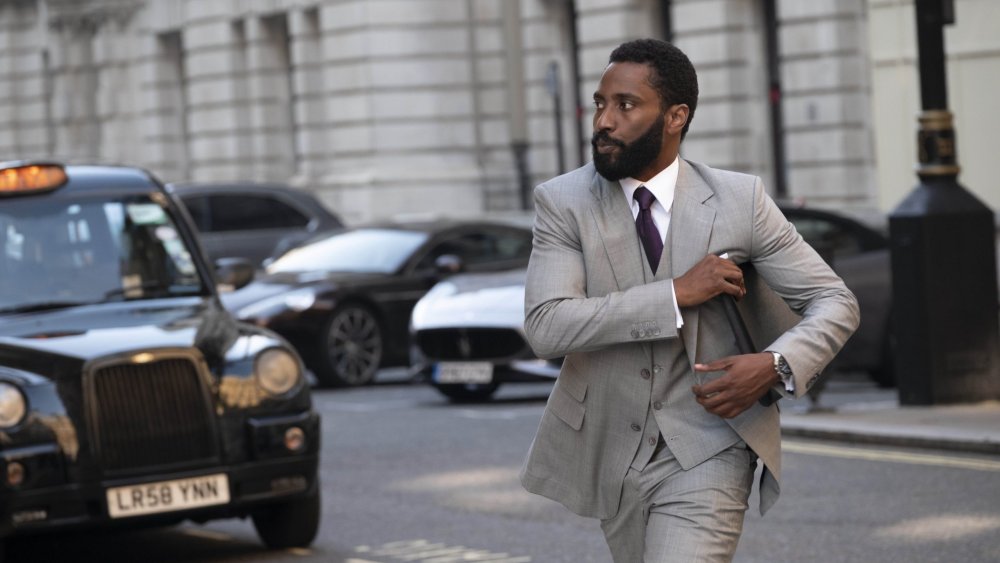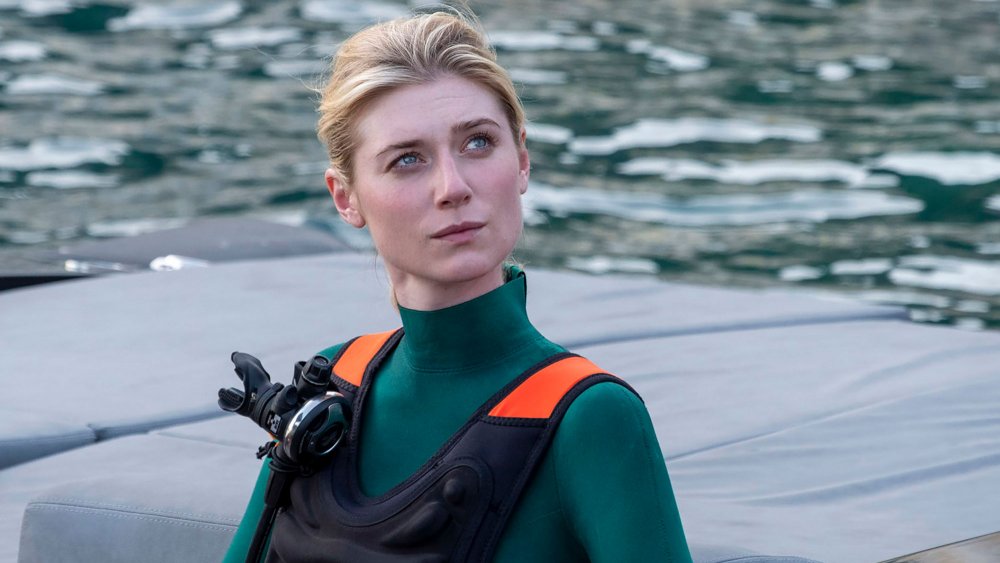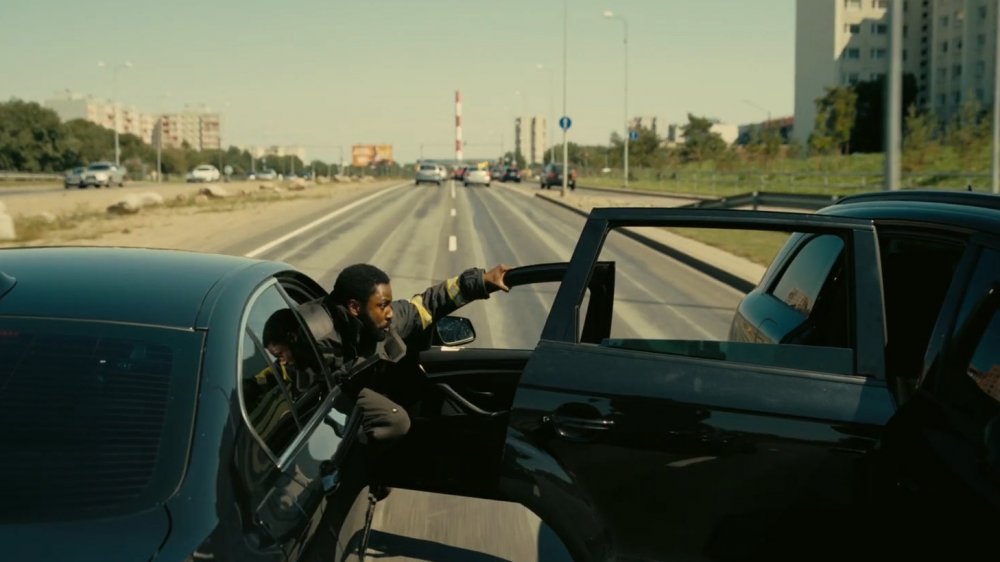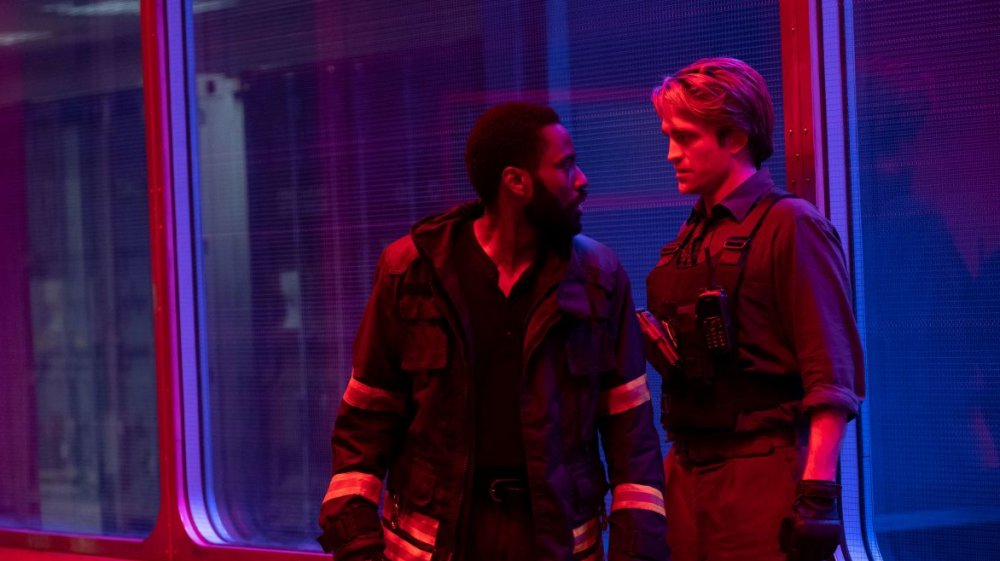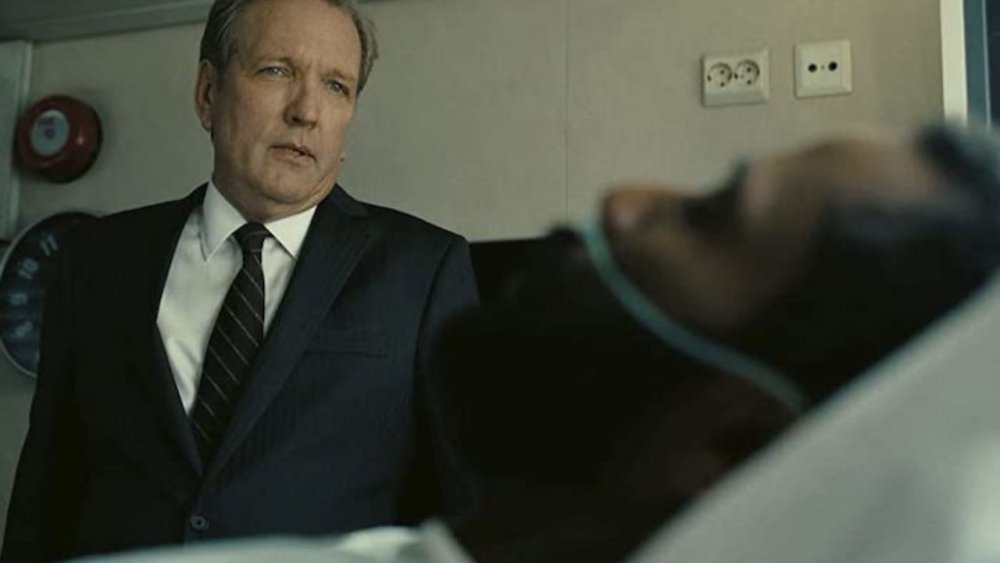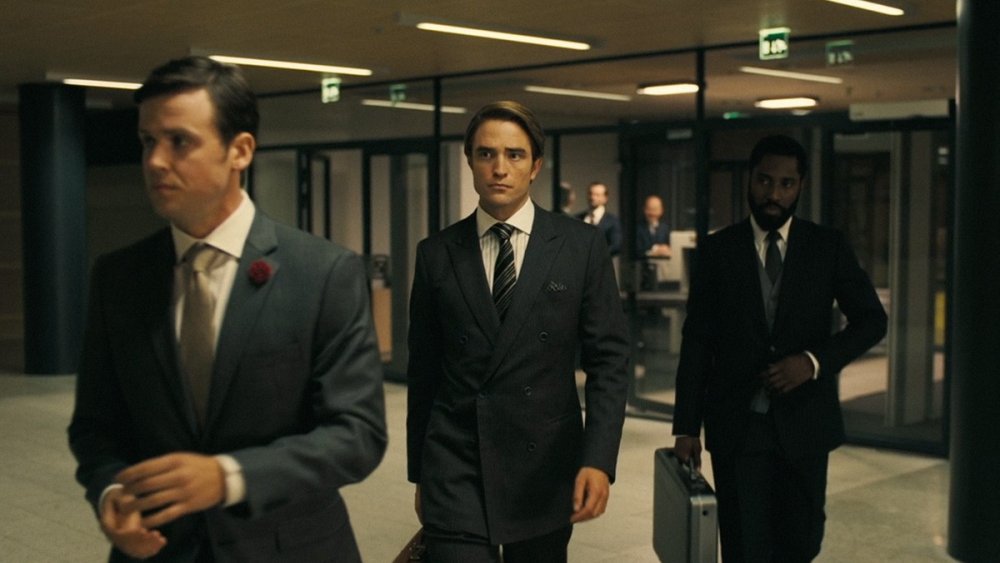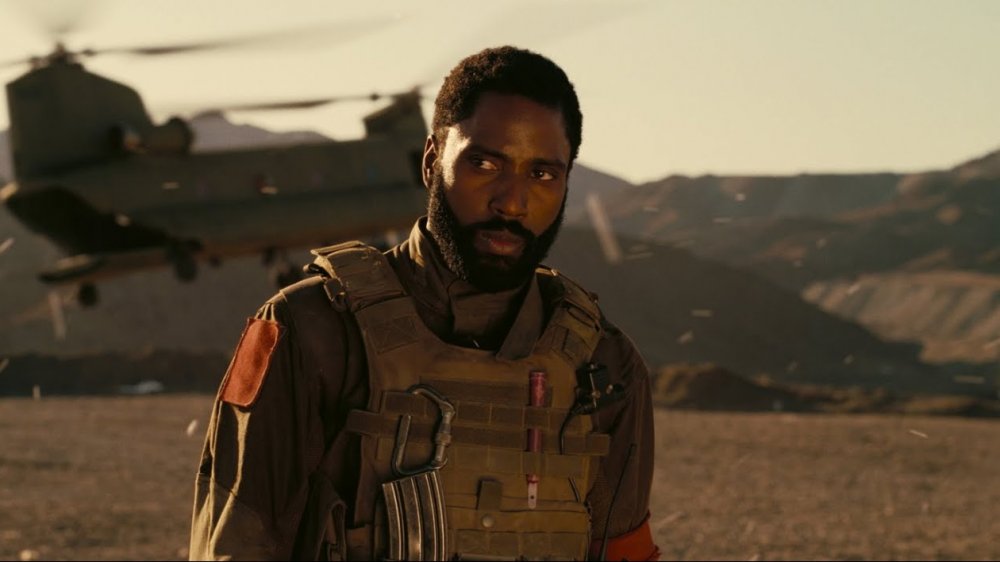5 Best And 5 Worst Things In Tenet
Tenet has a lot to offer the moviegoing audience, whether it's your first Christopher Nolan film or your eleventh. It's big, bold, and includes familiar faces and ideas as well as fresh ideas and new actors not previously part of his artistic vision. The stakes are always high for Nolan's films to perform at the box office, and 2020 certainly didn't make it any easier to achieve that lofty standard for revenue and critical acclaim.
All that being said, there's little doubt that Tenet will earn its rightful place in the upper tier of Nolan's filmography — it's a great ride and asks (and even answers some of) the big questions of human existence. No man, however, is a god, and no matter how talented a filmmaker might be, no film is absolutely flawless. Tenet isn't uneven by a wide margin, but there are points to make that highlight arguable mistakes in execution, and some more substantial than others.
All that being said, the highs Nolan delivers with Tenet are pretty incredible, and the movie's most outstanding moments make Tenet worth seeing, no matter your usual movie tastes. Do the movie's flaws offer a compelling argument to skip Christopher Nolan's latest mind-bending blockbuster? Judge for yourself: Here's a look at the best and worst things about Tenet's story and cinematic execution.
Best: Robert Pattinson
Most of Christopher Nolan's films are heavily star-studded and he, like many other directors, has a list of favorite actors to fall back on when starting pre-production on a new project. We can only hope Robert Pattinson gets added to Nolan's first-look list, because he rules in this movie.
Pattinson's character, Neil, has a particularly difficult part to play in this film, as he has an entire friendship with the Protagonist (John David Washington) and the knowledge that comes with it that he has to keep concealed from his friend at all times — at least, until the Protagonist figures it out for himself. Pattinson maintains that façade with ease and artistry, but throws in little bits of emotion here and there to portray Neil's inner conflict as he tries to repress his natural inclination to be the Protagonist's friend in their more casual conversations. It all helps the audience to understand that relationship in its totality later on.
He's a little goofy and fun, too — sometimes appearing in scenes with a loose tie and rumpled appearance when he doesn't need to be putting on airs for anybody, or aiming for humor and charmingly missing the mark. It adds a much-appreciated chaotic energy to the film, bucking Nolan's tendency to write rather emotionally sterile characters for twisty narratives that use people like pieces in a sophisticated game.
Worst: Audio mixing
It's been mentioned many times before, but Christopher Nolan's fondness for big, booming scores — a tradition Tenet lives up to admirably — has a tendency to get in the way of something very important to just about every movie. Specifically, dialogue.
Yes, Nolan characters frequently lie or say confusing things for the sake of the plot, but the audience generally does need to hear what people onscreen are saying in order to keep track of the story and understand how the dialogue affects everything else that's going on. The audio mixing in Tenet leaves something to be desired in that respect — especially given that Nolan opted to have characters wear breathing apparatus masks in multiple scenes while delivering what would seem to be extremely important lines of dialogue. (You really do have to care about that, no matter how cool Tom Hardy looks doing it.)
Given that Nolan has reportedly been to be extremely adamant that Tenet should be seen first in a theater, it's hard not to appreciate his interest in dialing the big-screen theater experience to the maximum level through the kind of intense bass and all-encompassing surround sound very few homes can recreate, but in this case, that effort was overzealous. Fortunately, the issue is something that can be easily fixed for the eventual VOD and Blu-ray distribution for at-home viewing — here's hoping Nolan and his mixing team take the hint that's been swirling around the internet since Tenet first hit theaters in Europe.
Best: Internal consistency -- with wiggle room
Tenet has a pretty unambiguous ending (and a surprisingly happy, at least as far as Nolan's films are concerned), which might surprise longtime fans of the director who've spent countless hours and commented on many a Reddit thread discussing the philosophical and moral ambiguities of some of his other works. That's a big ask for a movie as interested in the complexities of time as Tenet, but Nolan really stuck to his conceptual guns to make the characters' actions and their temporal effects matter in the midst of the story's time-traveling action, and make sure that ending sticks in the process.
On the other hand, Nolan wasn't too rigid, because relativity is part of what's at hand in the plot, too. It matters precisely when it needs to, and the movie is willing to shrug its shoulders and say there's no way to know something when the characters or the audience don't need to. Paradoxical? Naturally, but that's okay when paradox is part of the moral point of the film.
"Inversion," for example, is a concept that offers Nolan a major tool here in order to tell a story that has nothing directly to do with the ability to manipulate movements through time, and he clearly appreciated that he didn't need to turn that tool into anything more complicated than it had to be at any given moment in the movie. Just as the Protagonist has to learn to feel instead of think during the course of events in Tenet, Nolan seemed to approach the Tenet screenplay in a whole new way, letting the viewer feel its way through a complicated story without bogging things down with excessive details.
Worst: Kat's motivation
Elizabeth Debicki as Kat, Andrei Sator's (Kenneth Branagh) wife, does a magnificent job in her role. The trouble is that the role is, well, written a bit thin. Her entire motivation is boiled down to "wife and mother," and that doesn't really cut it for giving women their due in cinema anymore.
On top of that she's a battered wife, too, which is a trope that's viewed less favorably than ever in the post-#MeToo landscape. This in't a fundamental flaw, necessarily; it's neither the first nor the last time we'll see this old character type onscreen, and to Nolan's credit, Kat's journey through the film isn't just about being saved by a man — and she isn't a reward for the Protagonist as a romantic interest at the end, either. Instead, she conquers her oppressor through the power of her own will and her ability to finally grasp control of her own life. That's good — great, even. But it's all predicated on doing it for her child, and her motivation as a mother finally transcending her fear as an emotionally battered and physically abused wife. We can ask for better. It isn't that the way Nolan wrote Kate was necessarily harmful — but it's definitely boring and decidedly well-trodden territory. Andrei didn't necessarily need to have a child to be a controlling monster, and Kat didn't need to be a mother to have an interest in wanting to save literal spacetime.
Best: Those sexy, sexy visuals
One of the reasons audiences go to Christopher Nolan movies is to see extremely cool visual effects, and boy, does Tenet ever deliver. The filmmaker set that bar extremely high with blockbusters like Inception and Interstellar, and this film clears it —even if you happened to watch the movie on mute for some reason, it's a worthwhile experience purely on a visual level.
The fight choreography in particular is a stroke of genius, because no amount of editing can give you the viscerally impactful look these scenes achieve without tons of training — for the sequence in the vault during which the Protagonist fights himself, John David Washington and his stunt doubles would have to practice those sequences forward and backward, which requires extraordinary discipline in planning and movement. And again — they did it twice, from opposite perspectives. There's no other way to describe that but for a very lizard-brained "whoa, that's cool." You can also tell that most of the movie — which, in case you didn't know, was insanely expensive to make — utilizes chiefly practical stunts (that are touched up with post-production efforts, of course), even the one that shows an entire airplane ramming through a parking lot. A lot of the car stunts require multiple takes from multiple angles, and car stunts are some of the most expensive to execute in the industry. Warner Bros. needed to pony up another blank check for Nolan with Tenet — and once again, he produced amazing results.
Worst: Not enough Ives
It's kind of a quibble, but Ives (Aaron Taylor-Johnson) is a very entertaining character that clearly had a deep — and honestly pretty important — backstory that the audience never gets to see. That oversight becomes more of a problem when the movie ends with Ives in possession of the most important thing in the whole story: the Algorithm. Nolan needed to leave a little more time for this character to be explored, given his eventual significance to the plot and especially its conclusion.
Ives enters the story halfway through and quickly displays a level of practical knowledge about inversion, and combat utilizing it, that quite possibly surpasses Neil's. He is commander of what is obviously a very experienced combat team that specializes in temporal situations — Time SEALs, basically. That kind of training doesn't just appear in a person's brain and muscle memory one sunny afternoon.
This, too, is likely the kind of training the future Protagonist will eventually help create, but even an acknowledgement that that's the case from Ives — like Neil acknowledging the Protagonist can look forward to a great friendship with him — would have been prudent. After all, the original plan as conceived by Priya was to acquire the Algorithm whole, and Ives changes that mission on his own, which would seem to mean that he has to have a decent level of authority within Tenet. That would also be why Ives told the Protagonist that the two of them were all that made up the critical "splinter" team before the final operation began — Ives knew that only the Protagonist could be trusted with the eleventh-hour plan to separate the Algorithm.
Best: The emotional thesis
The ultimate moral Tenet wants to impart is a pretty wholesome and simple one — all things, people, and parallel timelines considered. The Protagonist is The Protagonist in really literal terms, and his motivation is not all that separated from the hero in a JRPG: he grows into his own self-confidence and acts with deep empathy to protect others, and when he falls short, he trusts his friends to help him even when he can't anticipate what he'll need or when. Friendship, trust, love, and killing God (at least insofar as Sator describes himself as a god) — Tenet is just like Final Fantasy.
Jokes aside, the emotional truth underlying the film is reflected most obviously in the little catchphrase that begins popping up halfway through: Ignorance is their strength. It sounds a little negative at first, but the point is a profound one — keeping information from one another is the strength of their trust in and love for each other.
Neil knows a lot about what's going to happen to the Protagonist and he doesn't tell him anything to help. Why? Trust in the Protagonist's individual ability and good faith because he is Neil's friend — or will be, or really always has been, poetically speaking. In reverse, the Protagonist originally gives Neil the mission we see many years hence. That too, is an expression of love and trust that Neil can get it done and literally save his life several times because they are friends. There's no kinder or more touching emotional center for a film, even when it's wrapped up in a complicated and grim storyline about the possible end of the universe.
Worst: Dialogue in the first half
Tenet's audio mixing definitely makes it more challenging to understand what's already a complicated story, but this problem is compounded by the way the actors deliver dialogue throughout the first half of the movie. It feels rushed, though it doesn't really need to be, and there is a distinctly stilted feel to the cast's delivery at first. Sometimes characters even talk over each other for no apparent reason — there's no established need to hurry all that much at any point in the first half of the movie. There's no benefit to having characters rattle off breathless, near run-on-sentences containing extremely complicated and nuanced theories of time and relativity to make them sound intelligent, and that happens in several cases up until the movie seems to catch its breath and recoup after Kat is wounded and the action returns to Oslo.
What makes all this particularly upsetting is the fact that the first half includes very, very critical exposition of how aspects of time travel works in the movie — it's information that pays all its dividends much later, and even more importantly, it underscores how some people think inversion works which isn't necessarily entirely correct, or how they're even lying to others about how it works. You have to understand what the original lie was in order to truly benefit from seeing the truth revealed. Tenet is smart, but there are times when it needs to slow down and make it just a little easier for the audience to absorb everything it's seeing and hearing.
Best: Musical score and its apparent cues
The Tenet score ends up being a bit of a double-edged sword at the moments when it surges up and over the dialogue, but in and of itself, it's excellent. Many a meme has been made riffing on Nolan's love for big, subwoofer-busting film scores, and that tendency is definitely heard here, but a new, fresh flourish has been added by the current hottest commodity in the film-composer market: Ludwig Göransson.
The Oscar-winning composer of Black Panther and more recently The Mandalorian was tapped to handle those duties for Tenet, and he put extra effort into the end result by including his own kind of musical wordplay. It might take an extra screening or two to pick them out, but at various points in the story, the music is played and then immediately musically inverted, either by playing notes in reverse progression to mirror the previous phrase or actually reversing the recording. What's more, it tends to occur at key points you see once in normal time, then again in an inverted context. First-time viewers may notice it most prominently at the beginning of the scene when four trucks surround the semi carrying the last piece of the Algorithm, and the Protagonist breaks his way in using the fire truck ladder.
Worst: Slightly too explanatory in parts
Christopher Nolan's plots are historically convoluted, but if you're paying attention, you can usually piece it together, and Tenet is no exception: In fact, the film makes several fairly obvious efforts to explain itself in order to prevent the audience — and the Protagonist — from getting too lost along the way. Maybe even a little bit too obvious, actually.
The Protagonist asks a lot of very direct questions that make sense, but they can also feel like a screenwriter's checkpoint for the audience, as if to say, "You keeping up? Great, let's move on." This feels the most pointed at the very end, with Neil and the Protagonist's final exchange. Half of it is a lovely emotional beat as the Protagonist realizes how important Neil is to him and vice versa, but it also serves as a last-minute checklist of answers to explain exactly what just happened, and it feels little clinical. In the long run, it's better to do that than to err on the side of not explaining anything at all, but it just feels a little unbalanced, tonally speaking.
Of course, this flaw — like all of Tenet's flaws — doesn't come anywhere close to sinking the film as a great experience overall. They're just the kind of mistakes that will naturally occur in any filmmaking process, even if you're Christopher Nolan.
